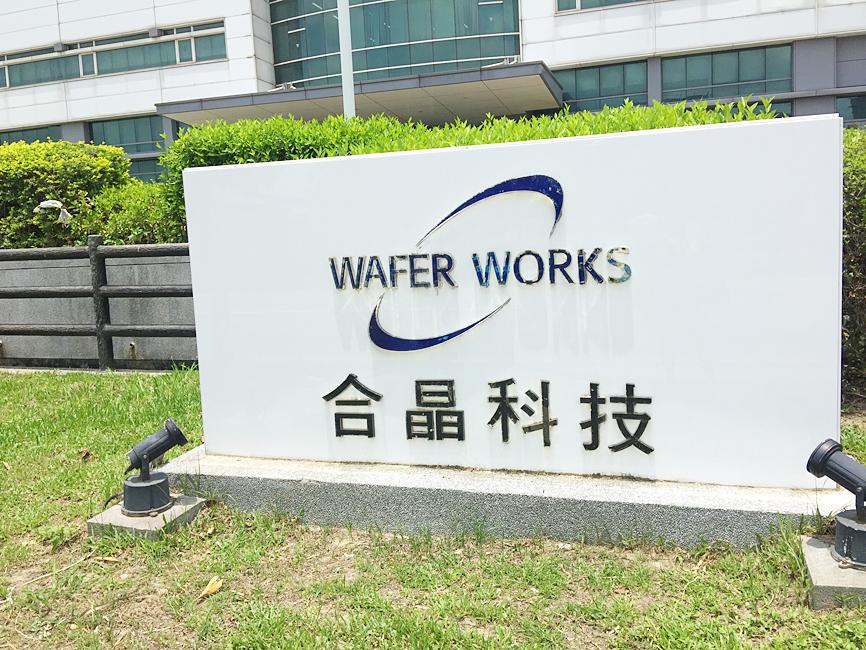Wafer Works Corp (合晶科技), the world’s No. 6 silicon wafer supplier, is to invest NT$2.4 billion (US$81.41 million) to expand its 12-inch wafer capacity at an existing plant in the Longtan (龍潭) section of Hsinchu Science Park (新竹科學園區) to meet rising demand for chips used in vehicles, the Ministry of Economic Affairs said yesterday.
Wafer Works in May 2019 received ministry approval for a NT$1.16 billion capacity expansion plan at its Longtan site, allowing the wafer maker to join the government’s Invest in Taiwan initiative, the ministry said in a statement.
The automotive sector accounted for 50 percent of Wafer Works’ total revenue of NT$10 billion last year, up from 37 percent in 2020, the company said.

Photo: Hung Yu-fang, Taipei Times
Wafer Works plans to build a new smart wafer production line and add new cleanrooms to boost capacity, aiming to address surges in demand for 12-inch wafers, the statement said.
The project is expected to create 48 new jobs, it said.
As part of the new project, the company is to install solar power generation systems, and water and waste recycling facilities to reduce carbon emissions, the ministry said.
The company also operates 12-inch factories in Zhengzhou in China’s Henan Province and in Shanghai, supplying wafers to Chinese customers, the company said.
COVID-19 lockdowns in China have made it difficult for its Shanghai site to ship products, though production remains normal, it said.
Wafer Works’ revenue last month jumped 26.53 percent from a year earlier to NT$1.04 billion, primarily due to increased prices, the company said.
The company generated revenue of NT$3.05 billion last quarter, up 33 percent from NT$2.29 billion in the first quarter last year, a company filing with the Taiwan Stock Exchange showed.
The ministry said its latest data showed that the Invest in Taiwan initiative has drawn investment commitments from 1,190 companies totaling NT$1.68 trillion, with 133,554 local jobs expected to be created.

Semiconductor shares in China surged yesterday after Reuters reported the US had ordered chipmaking giant Taiwan Semiconductor Manufacturing Co (TSMC, 台積電) to halt shipments of advanced chips to Chinese customers, which investors believe could accelerate Beijing’s self-reliance efforts. TSMC yesterday started to suspend shipments of certain sophisticated chips to some Chinese clients after receiving a letter from the US Department of Commerce imposing export restrictions on those products, Reuters reported on Sunday, citing an unnamed source. The US imposed export restrictions on TSMC’s 7-nanometer or more advanced designs, Reuters reported. Investors figured that would encourage authorities to support China’s industry and bought shares

TECH WAR CONTINUES: The suspension of TSMC AI chips and GPUs would be a heavy blow to China’s chip designers and would affect its competitive edge Taiwan Semiconductor Manufacturing Co (TSMC, 台積電), the world’s biggest contract chipmaker, is reportedly to halt supply of artificial intelligence (AI) chips and graphics processing units (GPUs) made on 7-nanometer or more advanced process technologies from next week in order to comply with US Department of Commerce rules. TSMC has sent e-mails to its Chinese AI customers, informing them about the suspension starting on Monday, Chinese online news outlet Ijiwei.com (愛集微) reported yesterday. The US Department of Commerce has not formally unveiled further semiconductor measures against China yet. “TSMC does not comment on market rumors. TSMC is a law-abiding company and we are

FLEXIBLE: Taiwan can develop its own ground station equipment, and has highly competitive manufacturers and suppliers with diversified production, the MOEA said The Ministry of Economic Affairs (MOEA) yesterday disputed reports that suppliers to US-based Space Exploration Technologies Corp (SpaceX) had been asked to move production out of Taiwan. Reuters had reported on Tuesday last week that Elon Musk-owned SpaceX had asked their manufacturers to produce outside of Taiwan given geopolitical risks and that at least one Taiwanese supplier had been pushed to relocate production to Vietnam. SpaceX’s requests place a renewed focus on the contentious relationship Musk has had with Taiwan, especially after he said last year that Taiwan is an “integral part” of China, sparking sharp criticism from Taiwanese authorities. The ministry said

US President Joe Biden’s administration is racing to complete CHIPS and Science Act agreements with companies such as Intel Corp and Samsung Electronics Co, aiming to shore up one of its signature initiatives before US president-elect Donald Trump enters the White House. The US Department of Commerce has allocated more than 90 percent of the US$39 billion in grants under the act, a landmark law enacted in 2022 designed to rebuild the domestic chip industry. However, the agency has only announced one binding agreement so far. The next two months would prove critical for more than 20 companies still in the process